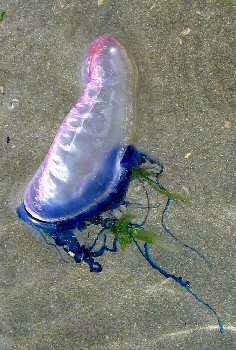|
Stinging Portuguese Man of
War wash up on UK shores

THE marine charity Marine Conservation
Society (MCS) are warring beach visitors not to touch a bizarre stinging
creature that's not a single animal, but a floating colony! The MCS have
received reports of several Portuguese Men of War, washing up on beaches in
Cornwall and Scilly Isles, just weeks after authorities in Ireland warned local
beach goers about a spate of recent stranding of this potentially dangerous
floating sea creature. This dangerous visitor also often fins its way onto
Merseyside's beaches, when this happens, due to the warm waters of the Gulf
Stream hitting our coastline. The group are warning that the stings can be
exceptionally painful and in extreme cases fatal. This is not a bag or a
MCS says the Portuguese Man of War (Physalia physalis) are only occasionally
reported in UK waters with the last significant UK strandings of the species
occurring in 2009 and 2012.
“We don't receive reports of Portuguese Man of War every year, but when we do
they can turn up in big numbers, usually around about this time of year. In the
last couple of weeks we've received several confirmed reports of Portuguese Man
of War stranded on beaches around Cornwall and the Scilly Isles. With the
earlier strandings in Ireland, these recent sightings could herald the arrival
of more of the creatures as they get blown in from the Atlantic.” said
Dr Peter Richardson, Head of the MCS Biodiversity Programme.
The Portuguese Man of War isn't a jellyfish, but is closely related, and
consists of a floating colony of hydrozoans; lots of really tiny marine
organisms living together and behaving collectively as 1 animal. A Cornish pasty
shaped, transparent purple float is visible on the water's surface whilst the
blue, tentacle like 'fishing polyps' that hang below the float can be tens of
meters in length.
“It's the tentacle like polyps that can give an agonising and potentially lethal
sting. Because a stranded Portuguese Man of War looks a bit like a deflating
purple balloon with blue ribbons attached, children will find it fascinating.
So, if you're visiting a Cornish beach this weekend it's well worth making sure
you know what these animals look like and that no 1 picks them up. We'd like
people to report any sightings of Portuguese Man Of War to our website so we get
a better idea of the extent of the strandings." said Dr Richardson.
1 of the animals was found recently at Portheras Cove, near Morvah, Cornwall, by
volunteers of the Friends of Portheras Cove environmental group. Delia Webb from
the group says it was found during a beach clean, lying among the plastic debris
that had blown in on the high tide:- "We find all sorts of strange and
unusual items at our tiny Cornish cove, and we have had strandings of Portuguese
Man of War before. They look amazingly beautiful, with hints of pink and blue,
but thankfully we were aware of the potential danger lying beneath, and knew not
to poke or prod it, just report the sighting to the MCS.”
If you spot a Portuguese Man of War then report the sighting immediately,
ideally with a picture, to the charity's
website, where a Jellyfish ID Guide, which
includes the Portuguese Man O War, can also be downloaded from the site. |
